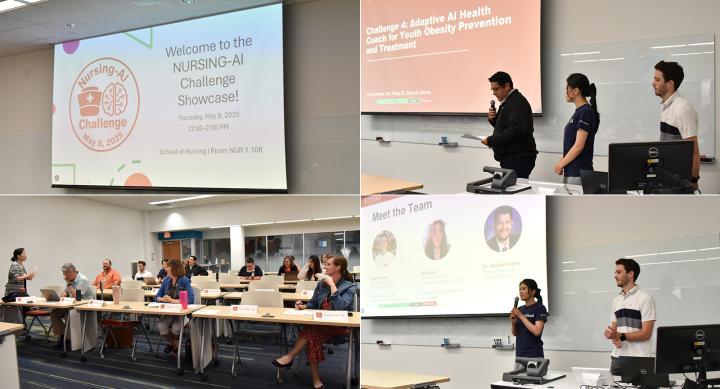
The inaugural NURSING-AI Challenge at The University of Texas at Austin School of Nursing brought together nursing faculty and students from across disciplines to imagine what’s possible when artificial intelligence is applied to real-world challenges in nursing.
Held in May 2025, the event invited eight teams to unveil tools designed to improve patient care, education and decision-making, using some of today’s most advanced AI technology.
The NURSING-AI Challenge, launched in Spring 2025, aims to foster collaboration between health experts and students studying computer science, information studies and engineering.
Faculty members from the UT Austin School of Nursing proposed specific challenges they encounter in their work, and interdisciplinary student teams developed AI-based solutions, using tools such as large language models, speech-to-text technology and customized content generators.
As part of the challenge, three projects received awards:
First Place: First place went to a project called Nightingale AI, created by undergraduate student Avery Gilbert from the School of Information, with mentorship from Eduardo Chavez, PhD, RN, clinical assistant professor at the School of Nursing. Designed to help nurse leaders on the front lines, Nightingale AI offers real-time mobile support for managing daily operations, such as staffing and patient surges. The tool allows users to input concerns via voice or text and receive tailored, evidence-based guidance in return, helping reduce burnout while improving decision-making under pressure.
Second Place: Second place went to DoseAI for its practical approach to multilingual patient education. Developed by Master of Science in Artificial Intelligence (MSAI) student Diego Barros, at the UT College of Natural Sciences, and guided by Li-Chen Lin, PhD, RN, CNRN, clinical assistant professor at the School of Nursing, the tool generates clear, accessible medication instructions using a combination of clinical information and authoritative Food and Drug Administration drug data. With an emphasis on language variety and accuracy, DoseAI equips nurses and clinicians to deliver information to patients in their preferred language, instantly.
Third Place: Taking third place was NoteWell, an AI-powered tool designed to improve clinical education by helping instructors provide structured, timely feedback to students during rotations. MSAI students Surendra Katari and Srikanth Bharatham worked with nursing faculty member Adam Blank, MSN, RN, clinical instructor, to build the system, which uses speech-to-text transcription, intelligent note enhancement, custom evaluation forms and one-click export options for documentation.
“The NURSING-AI Challenge demonstrates the powerful, far-reaching potential of interdisciplinary innovation,” said Bo Xie, PhD, FGSA. “Because of our close connection to patients and deep understanding of health systems, nursing is ideally positioned to bring these teams together and ensure that AI innovations are both practical and person-centered.”
Xie is a professor at UT Austin, holding appointments in both the School of Nursing and the School of Information. She directs the School of Nursing’s Center for Health Care Innovation and Technology Advancements (CHITA), which fosters interdisciplinary research to enhance health care through person-centered technological solutions. CHITA emphasizes collaboration among clinicians, engineers, computer scientists and information specialists to address real-world health care challenges. The Center also supports faculty through initiatives like the Health IT SPARK Grants, aimed at advancing innovative research and securing National Institutes of Health funding.